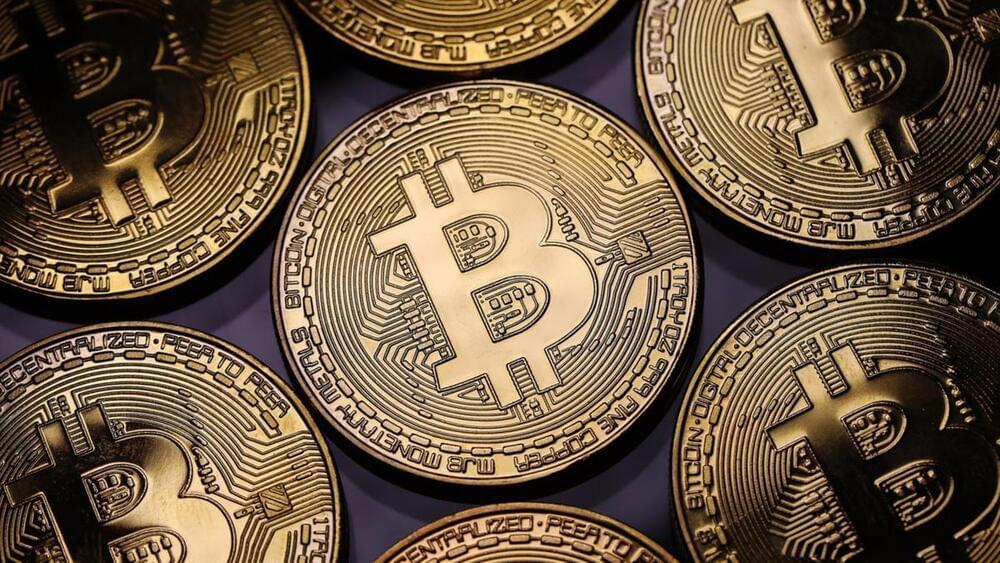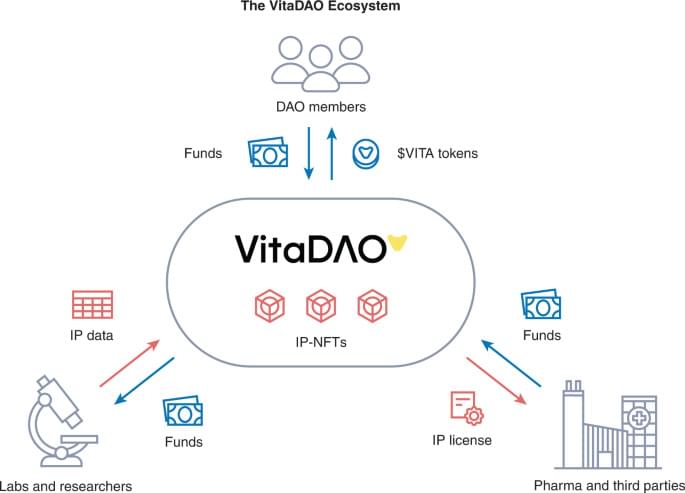The Merge is the result of years of decentralized coordination and innovation. On Merge Day, ConsenSys is hosting a 72-hour mint to celebrate the achievement of Ethereum core devs, client teams and researchers. Follow the link to claim your piece of history. Links to merge.consensys-nft.com. Learn more about the NFT drop.
Category: cryptocurrencies – Page 25
Black Holes May Be Covered in Vortex Structures According to New Study
Get a Wonderful Person Tee: https://teespring.com/stores/whatdamath.
More cool designs are on Amazon: https://amzn.to/3wDGy2i.
Alternatively, PayPal donations can be sent here: http://paypal.me/whatdamath.
Hello and welcome! My name is Anton and in this video, we will talk about.
Links:
https://www.science.org/doi/10.1126/science.1060182
https://arxiv.org/pdf/1609.01639.pdf.
https://www.nsf.gov/news/mmg/mmg_disp.jsp?med_id=59577&from=
https://www.rle.mit.edu/cua_pub/ketterle_group/Projects_2001…Vortex.htm.
https://dx.doi.org/10.1103/PhysRevLett.129.061302
ISS experiments: https://youtu.be/UEEccJLYVXM
Another similar finding: https://youtu.be/FsTbMfQP7b0
#quantumphysics #blackhole #vortex.
Support this channel on Patreon to help me make this a full time job:
https://www.patreon.com/whatdamath.
Bitcoin/Ethereum to spare? Donate them here to help this channel grow!
bc1qnkl3nk0zt7w0xzrgur9pnkcduj7a3xxllcn7d4
or ETH: 0x60f088B10b03115405d313f964BeA93eF0Bd3DbF
Space Engine is available for free here: http://spaceengine.org.
Enjoy and please subscribe.
Twitter: https://twitter.com/WhatDaMath.
Consciousness, Qualia, and Integrated-Information Theory (IIT)
TWITTER https://twitter.com/Transhumanian.
PATREON https://www.patreon.com/transhumania.
BITCOIN 14ZMLNppEdZCN4bu8FB1BwDaxbWteQKs8i.
ETHEREUM 0x1f89b261562C8D4C14aA01590EB42b2378572164.
LITECOIN LdB94n8sTUXBto5ZKt82YhEsEmxomFGz3j.
Neuralink, Neural Lace, and Brain-Computer Interfaces (BCIs)
https://youtube.com/watch?v=DGbZ9J2nlNA&feature=share
TWITTER https://twitter.com/Transhumanian.
PATREON https://www.patreon.com/transhumania.
BITCOIN 14ZMLNppEdZCN4bu8FB1BwDaxbWteQKs8i.
BITCOIN CASH 1LhXJjN4FrfJh8LywR3dLG2uGXSaZjey9f.
ETHEREUM 0x1f89b261562C8D4C14aA01590EB42b2378572164
LITECOIN LdB94n8sTUXBto5ZKt82YhEsEmxomFGz3j.
CHAINLINK 0xDF560E12fF416eC2D4BAECC66E323C56af2f6666.
More Major Updates From James Webb Telescope and Cool Discoveries
Get a Wonderful Person Tee: https://teespring.com/stores/whatdamath.
More cool designs are on Amazon: https://amzn.to/3wDGy2i.
Alternatively, PayPal donations can be sent here: http://paypal.me/whatdamath.
Hello and welcome! My name is Anton and in this video, we will talk about new updates from James Webb Space Telescope.
Links:
https://arxiv.org/abs/2207.11658
https://webb.nasa.gov/
https://arxiv.org/abs/2208.14990
JWST captures the previously spotted Einstein Ring Galaxy SPT-S J041839-4751.8 with MIRI
byu/Spaceguy44 injameswebb
https://www.sciencealert.com/astronomers-discover-clouds-of-…ailed-star.
https://arxiv.org/abs/2209.00620
https://exoplanets.nasa.gov/news/1670/nasas-roman-mission-wi…wn-dwarfs/
R136a1 updates: https://youtu.be/JJYTqn9uQpI
Most distant star: https://youtu.be/nuWuTTHOAOo.
#jwst #jameswebb #jameswebbspacetelescope.
Support this channel on Patreon to help me make this a full time job:
https://www.patreon.com/whatdamath.
Bitcoin/Ethereum to spare? Donate them here to help this channel grow!
bc1qnkl3nk0zt7w0xzrgur9pnkcduj7a3xxllcn7d4
or ETH: 0x60f088B10b03115405d313f964BeA93eF0Bd3DbF
Space Engine is available for free here: http://spaceengine.org.
Enjoy and please subscribe.
Twitter: https://twitter.com/WhatDaMath.
Groundbreaking Proton Discovery That May Rewrite Science Textbooks
Get a Wonderful Person shirt: https://teespring.com/stores/whatdamath.
Classic Mars design is on Amazon: https://amzn.to/3wDGy2i.
Alternatively, PayPal donations can be sent here: http://paypal.me/whatdamath.
Hello and welcome! My name is Anton and in this video, we will talk about a new groundbreaking discovery about a proton — a charm quark on the inside?
Links:
Previous video: https://youtu.be/8BTZOz850GI
Unusual experiment findings: https://youtu.be/jYAsW8OXg7c.
https://www.nature.com/articles/s41586-022-04998-2
https://www.sciencedirect.com/science/article/abs/pii/0370269380903640
https://www.jlab.org/
https://www.mdpi.com/2571-712X/5/2/15
#charm #proton #physics.
Support this channel on Patreon to help me make this a full time job:
https://www.patreon.com/whatdamath.
Bitcoin/Ethereum to spare? Donate them here to help this channel grow!
bc1qnkl3nk0zt7w0xzrgur9pnkcduj7a3xxllcn7d4
or ETH: 0x60f088B10b03115405d313f964BeA93eF0Bd3DbF
Space Engine is available for free here: http://spaceengine.org.
Enjoy and please subscribe.
Twitter: https://twitter.com/WhatDaMath.

New Linux malware evades detection using multi-stage deployment
A new stealthy Linux malware known as Shikitega has been discovered infecting computers and IoT devices with additional payloads.
The malware exploits vulnerabilities to elevate its privileges, adds persistence on the host via crontab, and eventually launches a cryptocurrency miner on infected devices.
Shikitega is quite stealthy, managing to evade anti-virus detection using a polymorphic encoder that makes static, signature-based detection impossible.
Nitrokod stealth malware hides on a pc for a month before it goes to work infects over 111,000 users
A Turkish entity going by the name of Nitrokod has been accused of running a campaign by spoofing a desktop version of Google Translate to actively mine cryptocurrency from its more than 111,000 users across eleven countries (UK, US, Sri Lanka, Greece, etc., Israel, Germany, Turkey, Cyprus, Australia, Mongolia, and Poland) in 2019.
In addition to Google Translate, there are five other fake desktop applications on the Nitrokod website. Most of them impersonate programs that are not officially available as desktop applications, but as web or mobile applications, which makes the desktop version created by the attackers particularly attractive. In any case, they are popular applications that can be found on websites such as Softpedia and UpToDown.
Six fake applications available on the Nitrokod website. When installing any of these programs, the malicious effects do not manifest until after a sequence of dropper for almost a month after installation, in order to hide such effects from the antiviruses.

Crypto platform accidentally transfers $10.5m to Melbourne woman — now they want it back
When you hit the jackpot-or don’t.
Imagine receiving $10.5 million while expecting a $100 refund to be transferred to your bank account and no one, except you, recognizes it until seven months have passed. That’s recently what happened in Melbourne, Australia when a cryptocurrency company bestowed a fortune to a woman, initially reported by 7NEWS. Back in May 2021, Crypto.com, one of the world’s largest cryptocurrency trading platforms, transferred the amount to Thevamanogari Manivel. Upon receiving the money, Manivel and her sister Thilagavathy Gangadory started spending it like greased lightning.
It took the company seven months to realise its mistake. By the time they did, millions had already been spent.
